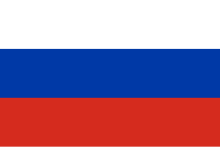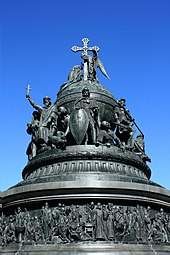
Back القومية الروسية Arabic Nacionalisme rus Catalan Nacionalismo ruso Spanish Venäläinen nationalismi Finnish Nationalisme russe French Nacionalismo ruso Galician Ռուսական ազգայնականություն Armenian Nasionalisme Rusia ID 러시아 국민주의 Korean Krievu nacionālisms Latvian/Lettish
You can help expand this article with text translated from the corresponding article in Russian. (March 2022) Click [show] for important translation instructions.
|


Russian nationalism (Russian: Русский национализм) is a form of nationalism that promotes Russian cultural identity and unity. Russian nationalism first rose to prominence as a Pan-Slavic enterprise during the 19th century Russian Empire, and was repressed during the early Bolshevik rule. Russian nationalism was briefly revived through the policies of Joseph Stalin during and after the Second World War, which shared many resemblances with the worldview of early Eurasianist ideologues.[1]
Following the collapse of Soviet Union, Russian nationalism has been associated with Eurasianism, re-invigorated through the Eurasia Movement of Russian philosopher Aleksandr Dugin. Neo-Eurasian socio-political programme has gained widespread acceptance in Putinist Russia; with Dugin's books, treatises and lectures being advocated through universities, schools, military institutes, police academies and other governmental organizations as part of Putin government's embrace of authoritarianism and condemnation of liberal democracy.[2][3]
The definition of Russian national identity within Russian nationalism has been characterized in different ways. In ethnic terms one including asserting that those identified as ethnic Russians are the Russian nation, another is the All-Russian nation concept developed in the Russian Empire that views Russians as having three sub-national groups within it including Great Russians (those commonly identified as ethnic Russians today), Little Russians (Ukrainians), and White Russians (Belarusians). Russian nationalists have identified Russia as the main successor of the Kievan Rus' and typically view the arising of separate national identities of Belarusians and Ukrainians as having broken away from Russian national identity. In the Eurasianist perspective, Russia is distinctive civilization separate from both Europe and Asia, and includes ethnic non-Russians of Turkic and Asiatic cultures.
- ^ Nugraha, Aryanta (February 2018). "Neo-Eurasianism in Russian Foreign Policy: Echoes from the Past or Compromise with the Future?". Jurnal Global & Strategis. 9 (1): 99–100. doi:10.20473/jgs.9.1.2015.95-110. Archived from the original on 2023-07-06 – via Global Strategis.
- ^ Garman, Liam (2022-05-26). "Neo-Eurasianism – placing Russia on a path of collision with the West". Defence Connect. Archived from the original on 2022-11-19.
- ^ Lewis, Lall, Alexandra, Marie (2023-07-04). "From decolonisation to authoritarianism: the co-option of the decolonial agenda in higher education by right-wing nationalist elites in Russia and India". Higher Education. doi:10.1007/s10734-023-01074-0.
{{cite journal}}: CS1 maint: multiple names: authors list (link)
© MMXXIII Rich X Search. We shall prevail. All rights reserved. Rich X Search